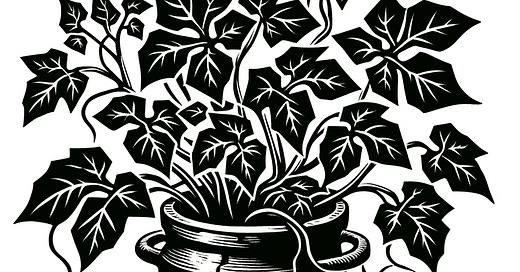The Sweet Potato Vines overflowing the pots in my backyard are wilting, which is not an uncommon sight for me to see. I’m always looking for it: the slackness in the vine, the browning at the leaf’s edge.
Many summers ago I started potting these “spillers” because of their gorgeous neon citrus color, and their ability to power through heat. But I think the main reason I plant them is that they’re so satisfying. They’re rapid growers, which, as an amateur gardener, delights my heart.
The only problem is that they easily overrun their soil.
That’s actually why they’re wilting now. It’s not a nutritional deficiency or sun damage. They’re simply outgrowing the pot, making it hard to diffuse water throughout the vine. Every time I see this, I know what I have to do.
To save it; I have to sever it.
—
It usually goes unnoticed, but very early in the Bible, before any talk of a snake or sin, we discover that Adam couldn’t find fulfillment, something (someone) was missing.
It’s a bit scandalous.
God creates an entire universe, a garden paradise full of fruit bearing trees, freshwater rivers, animals of all shapes and sizes—he gifts it all to Adam, and somehow it isn’t enough. Did God make a mistake, did something slip his mind?
No. God intentionally creates Adam unfulfilled, incomplete.
To find fulfillment, Adam must submit to a kind of sacrifice, a surrender, a severing of his rib for Eve. Why? Why not just create both Adam and Eve from dust? Why not save Adam the pain of incision, the sore and swollen aches of recovery? Why begin the human family with a wound? Why start with a scar?
I think God wants to teach Adam something fundamental about being human, that is, if you’re going to find fulfillment, you must give-of-yourself. You must sacrifice. Adam is invited into the process finding fulfillment. And the same is true for us.
God doesn’t create us fulfilled; he invites us to participate in our own fulfillment.
Just coming to terms with this self-giving way of being has been a large part of what I’ve had to work out in the Purgative way. “I must decrease, so he can increase” was the Forerunner’s way of putting it. I don’t think I’ve always believed that, nor understood how to really live it — I’m still not certain I know. But I think I can say this: after a lot of following Christ, a lot of training and a lot of failure, I think I believe it now.
I want this fulfillment, and I want to give myself away.
God will help me do the heavy lifting, of course, just like he did for Adam: making the incision, severing the rib, and forming new life around it. But I’ve got to consent and cooperate.
—
Here’s one last thing I love about the story, giving-of-self comes before “the Fall.” It’s not the consequence of sin. It’s not a propitiation; it’s an initiation, an invitation into trinitarian life.
One of my favorite theologians, Rowan Williams, speaks of the eternal existence of God that is kenotic, meaning, an ‘eternal outpouring,’ a never-ending gift, self-sharing without limit. In other words, giving-of-self is not so much what the Godhead does, it’s who the Godhead is. When we see the Son empty himself into the body of a Jewish baby or hanging bare in the Jerusalem sun, we’re not looking at one-off events, interruptions in the typical divine way of doing things. We’re looking at the essence of divine life, expressions of the kind of life that’s been going on forever in God, the kind of life that gives itself away, the kind of life we’re invited to penetrate, receive, and ultimately become.
What the Trinity communicates to us, both at the very beginning with Adam, and at the very end with Christ, is that to become fully who we are designed to be—like God—we must learn to give-of-ourselves.
To become more, we must become less.
We must sever the vine. We must sacrifice the rib. Or in those startling words of Jesus himself, “If anyone would come after me, let him deny himself and take up his cross and follow me (Matt 16:25).”





Wonderful! I believe the same principle is often present in prayer. I do not experience God's gift to me until I have emptied myself in speaking to Him. It is not until one is empty that they can receive a gift in its fullness. I do not "hear" God until first I have spoken. He is always first and yet also always second. This is also trinitarien--He is the one being spoken to, the one who is the object of love, and yet He also is the one praying in us. And lastly, He is the gift that the One we love extends to us after He has gotten through praying within us.
Thank you for sharing this, Jonathan. I immediately had to think about Meister Eckhart and also Kierkegaard. And Hildegard. And Edith Stein. And all the other wisdom teachers who write on self-emptying. Many philosophers had great trouble understanding e.g. Kierkegaard's emphasis on "dying away." I guess it is because so few are also gardeners. It is easier to understand if one also works with soil and seeds.